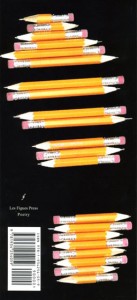The Pedestal Magazine’s JoSelle Vanderhooft has posted a review of three Les Figues titles: Allison Carter’s A Fixed, Formal Arrangement, Kim Rosenfield’s re:evolution, and Stan Apps’ God’s Livestock Policy.
 Of A Fixed, Formal Arrangement, Vanderhooft writes,
Of A Fixed, Formal Arrangement, Vanderhooft writes,
In her introduction to Los Angeles writer/designer Allison Carter’s work of prose/poetry, A Fixed, Formal Arrangement, author Danielle Dutton writes: ‘I was reminded of Woolf, of Stein, of Diane Williams…Renne Gladman, Thalia Field, Pamela Lu. A tradition of women writing. Of experimental prose.’ Dutton’s comparison of Carter’s work to that of Virginia Woolf and particularly that of Gertrude Stein is not only apt, but essential for the reader to keep in mind when approaching A Fixed, Formal Arrangement. Much like these grand dames of 20th Century Western literature, Carter uses disjointed language, repetition, digression and diversion to explore the frenetic human mind of the 21st Century and the many stresses and challenges bearing down upon it.
On re:evolution:
Rosenfield’s book is probably the closest a poet can come to melding the language of science and poetry so clinically and strangely. Take, for example, this selection from re: evolution’s Chapter 8, which mines the shelves of geology, paleontology and biology to discuss the often baffling evolution of flora:
Fossils document our imperfections
Then, there was the use of a great tree
Whose pollen was difficult to transport from
Tree to tree, but each tree had a
Tendency to have flowers with separate sexes
When the sexes were separated, there were
Masculine flowers with feminine qualities.
There is a tendency toward limited variation
I believe that antique structures
Improvise, transform, and by an internal force
Which constructs to support each individual in his or
her contemporary variations.
It seems strange to mention Milton’s Paradise Lost in conjunction with a book like God’s Livestock Policy, because the two stand at cross purposes. Where the purpose of Milton’s epic poem was to ‘justify the ways of God to men,’ the purpose of Apps’s experimental collection is to explain the justifications men use to distort God’s ways. As Apps explains in “This Book,” the argument to God’s Livestock Policy, the centuries of human thinking about God in human terms have contaminated God, much as a plant spewing toxins pollutes a river: “You can’t take the burned-up gasoline out of the oxygen. You can’t take human falsehood out of God. It has been put in, you breathe the air, you’re breathing someone’s soot, you think of God, you’re thinking someone’s self-indulgent fantasy…When you think of God, your head fills up with the stickiest most human love-notes and ambitions to kill people and build things on their land.”
Read the full review at The Pedestal Magazine.

Comments are closed.